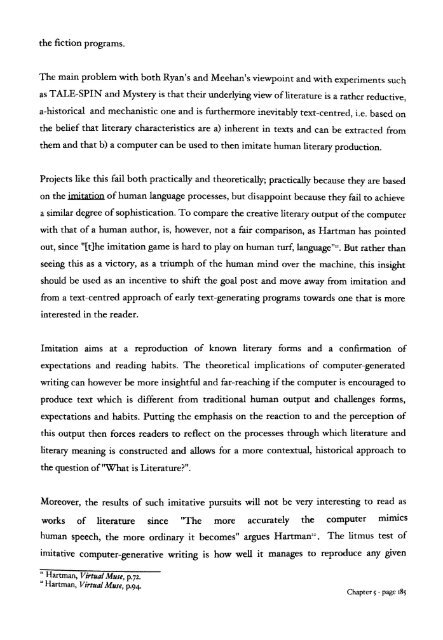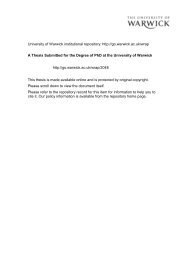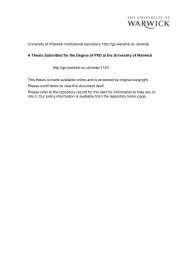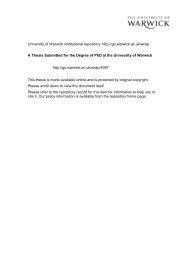From Page to Screen - WRAP: Warwick Research Archive Portal ...
From Page to Screen - WRAP: Warwick Research Archive Portal ...
From Page to Screen - WRAP: Warwick Research Archive Portal ...
You also want an ePaper? Increase the reach of your titles
YUMPU automatically turns print PDFs into web optimized ePapers that Google loves.
the fiction programs.<br />
The main problem with both Ryan's and Meehan's viewpoint and with experiments such<br />
as TALE-SPIN and Mystery is that their underlying view ofliterature is a rather reductive,<br />
a-his<strong>to</strong>rical and mechanistic one and is furthermore inevitably text-centred, i.e. based on<br />
the belief that literary characteristics are a) inherent in texts and can be extracted from<br />
them and that b) a computer can be used <strong>to</strong> then imitate human literary production.<br />
Projects like this fail both practically and theoretically; practically because they are based<br />
on the imitation ofhuman language processes, but disappoint because they fail <strong>to</strong> achieve<br />
a similar degree ofsophistication. To compare the creative literary output ofthe computer<br />
with that of a human author, is, however, not a fair comparison, as Hartman has pointed<br />
out, since "[tjhe imitation game is hard <strong>to</strong> play on human turf, language'?'. But rather than<br />
seeing this as a vic<strong>to</strong>ry, as a triumph of the human mind over the machine, this insight<br />
should be used as an incentive <strong>to</strong> shift the goal post and move away from imitation and<br />
from a text-centred approach of early text-generating programs <strong>to</strong>wards one that is more<br />
interested in the reader.<br />
Imitation alms at a reproduction of known literary forms and a confirmation of<br />
expectations and reading habits. The theoretical implications of computer-generated<br />
writing can however be more insightful and far-reaching if the computer is encouraged <strong>to</strong><br />
produce text which is different from traditional human output and challenges forms,<br />
expectations and habits. Putting the emphasis on the reaction <strong>to</strong> and the perception of<br />
this output then forces readers <strong>to</strong> reflect on the processes through which literature and<br />
literary meaning is constructed and allows for a more contextual, his<strong>to</strong>rical approach <strong>to</strong><br />
the question of"What is Literature?".<br />
Moreover, the results of such imitative pursuits will not be very interesting <strong>to</strong> read as<br />
works of literature since "The more accurately the computer mimics<br />
human speech, the more ordinary it becomes" argues Hartman", The litmus test of<br />
imitative computer-generative writing is how well it manages <strong>to</strong> reproduce any given<br />
II Hartman, VirtualMuse, P.72.<br />
U Hartman, Virtual Muse, P.94.<br />
Chapter 5 - page 185





